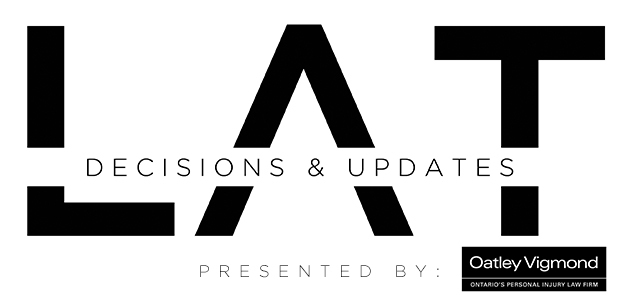V1401 – The Real World versus Income Replacement Benefit Stoppages

Whether our backgrounds are in the legal, insurer, or healthcare industries, we can surely all celebrate when our injured clients successfully rehabilitate and return to work following a motor vehicle accident. Such outcomes, with the joint contributions and efforts of many involved parties, are truly wonderful in nature.
In contrast, we sometimes witness the pain and disrupt suffered by our clients when their insurers impose one-sided terminations of much-needed income replacement benefits. Such stoppages often occur without significant notice and without client willingness or ability to engage in return to work planning.
An income replacement benefit is payable to an insured person within the first 104-weeks of injury so long as the insurer accepts that the person suffers a substantial inability to engage in the essential tasks of their pre-accident employment or self-employment. Beyond 104-weeks, the benefit continues so long as the insurer accepts that the person suffers a complete inability to engage in any employment or self-employment for which the person is reasonably suited by way of training, education or experience.
Typically, an insurer will rely upon the opinions of medical and vocational examiners of its choosing when making determination about a person’s ongoing entitlement to income replacement benefit. If the insurer determines that the insured person is no longer entitled to the benefit, then it must confirm the medical and any other reasons for its determination.
In the recent LAT decision, M.A. and Unifund Assurance Company (Tribunal File No. 19-000209/AABS), Adjudicator Avvy Go considered the merits of a stoppage of income replacement benefit. In this case, the applicant had worked as a cleaner for a coffee shop franchise prior to being injured in an accident in March 2016. A jobsite analysis was completed in relation to the occupation. It confirmed that the essential tasks of the position required major weight bearing ability as well as stooping, kneeling, crouching, twisting, pushing, lifting, and reaching. Unifund paid an income replacement benefit to M.A. until March 2017. The stoppage of benefit was processed as a result of the insurer’s interpretation of its insurer examination reports.
In processing the denial of ongoing income replacement benefit, Unifund portrayed that the examination result was that M.A. did not suffer a substantial inability to engage in the essential tasks of job as a cleaner. However, in rendering a decision on the matter, Adjudicator Go recognized that the insurer’s examiner had in fact acknowledged M.A.’s deconditioning and noted that she would benefit from accommodations in return to work such as flexible scheduling and pacing by sitting, standing and taking breaks at her own discretion.
In detailing a finding that M.A. was indeed entitled to income replacement benefit within the 104-week post-accident period, Adjudicator Go stated as follows:
“It is not reasonable to expect in a real world setting, that someone who works as a cleaner in a [coffee shop], could negotiate with her employer, such favourable terms of working conditions as to allow her to complete her tasks “on a flexible schedule, utilizing pacing by sitting, standing, and taking breaks at the claimant’s own discretion.” To find otherwise is to ignore the reality facing employees working in low-waged precarious jobs where they often lack the power to negotiate favourable working conditions.”
This decision is a perfect reminder to all of us that we must think critically about not just the conclusion of reports but about report content. While it may not occur with frequency, adjusters do have every ability to read an insurer examination report and render a determination that goes against the examiner’s final conclusions; such an action would demonstrate handling of a claim with the utmost good faith. Where an insurer may fail to think critically to this degree, other stakeholders in the claim may have voices that can be heard – counsel, healthcare providers, claimants and their families may certainly speak up to object to stoppages of benefits that appear to be unreasonable or lacking in rationale. We encourage insurers to remain open-minded to such feedback as may be received following determinations and stoppages of benefits.
Official Decision:
19-000209, M.A. and Unifund Assurance Company
